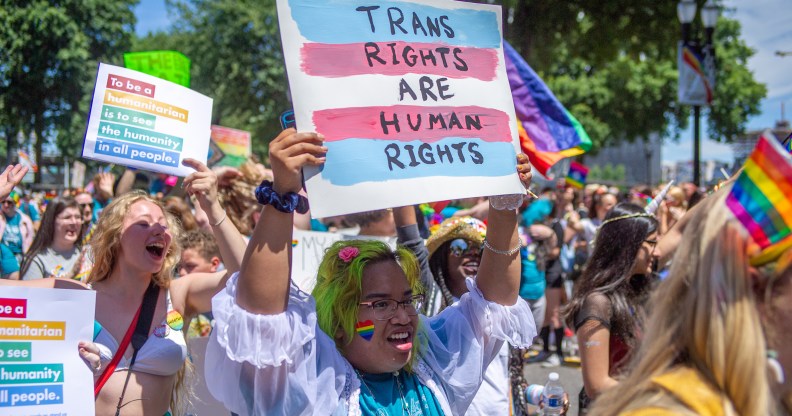Hate-crime laws updated in Oregon to include gender identity

Portland Pride Parade, 2019. (Diego Diaz/Icon Sportswire/ Getty)
Gender identity will now be a protected class in Oregon, in the most significant update to the state’s hate-crime laws since the 1980s.
The new measures, signed by the Democrat Oregon governor Kate Brown, also close a loophole that meant people who committed hate crimes alone, rather than in groups, received lighter sentences.
“Our hate crime laws are sorely out of date and were written decades ago,” said Zakir Khan, board chair of the Council on American-Islamic Relations, told the Associated Press. “This update is needed to provide justice to so many survivors.”
Oregon’s previous law meant that a hate crime was only considered a hate crime if two or more people harmed, or threatened to harm, another person on the basis of their race, colour, religion, sexual orientation, disability or national origin.
If only one person was involved, it was considered a misdemeanour.
“This creates a peculiar scenario where two defendants spraying racist graffiti on a wall might reasonably expect to be punished more harshly than one individual who physically attacks someone because of the colour of their skin,” said the state’s Attorney General Ellen Rosenblum during a hearing earlier this year.
The new law also makes it a crime to assault or threaten to harm someone based on their “membership in a protected class,” and Oregon has followed other US states in clarifying that gender identity is considered a protected class.
Oregon hate crimes increasing
According to FBI data, hate crimes in Oregon increased by 40% from 2016 to 2017, and at the same time convictions and arrests for those crimes have gone down.
A lack of understanding may be leading to local law enforcement agencies under-recording hateful incidents, and Brown acknowledged this with the new law that strengthens the definition of bias crimes to encourage more accurate data collection.
“Too often people are turned away from law enforcement because there was no criminal activity,” said Ricardo Lujan-Valerio, policy associate at the ACLU of Oregon.
“People who would have previously been turned away will now be connected to services and community support.”
In 2017, Oregon became the first US state to legally recognise non-binary trans people.
Brown, who is openly bisexual, signed the new bill acknowledging a third gender into law. She also made history as the first out LGB person to win election as governor of a US state.

